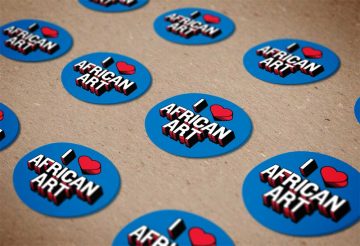
We Are…: Women Warriors
“The problem with gender is that it prescribes how we should be rather than recognizing how we are.”
—Chimamanda Ngozi Adichie, We Should All Be Feminists
Master of Kasadi (Kongo artist)
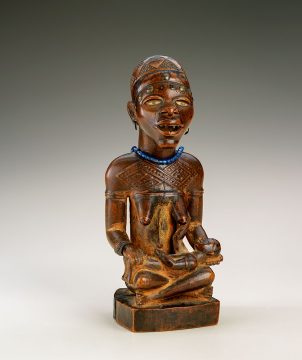
Maternity figure (phemba)
Mid-19th century
Wood, glass, glass beads, brass tacks, pigment
Purchased with funds provided by the Smithsonian Collections Acquisition Program, 83-3-6
Hero in History: Queen Ana Njinga
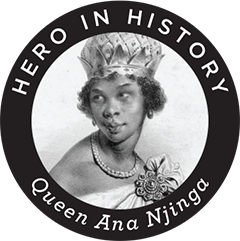
- A skilled diplomat and military tactician, Njinga was queen of the kingdom of Ndongo, later conquering Matamba when forced out of her original court.
- Nzinga offered sanctuary to runaway slaves while resisting the Portuguese who sought a more pliable leader for the kingdoms.
- Nzinga negotiated a treaty with the Dutch against the Portuguese—pitting one European power against another.
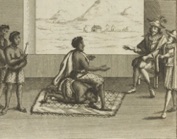
Widener Library, Harvard University
Wè artist
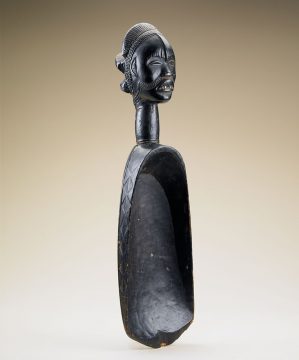
Montagnes District, Côte d’Ivoire
Ceremonial spoon (wa ke mia)
Early to mid-20th century
Wood, metal, oil
Gift of Walt Disney World Co., a subsidiary of The Walt Disney Company, 2005-6-58
Hero in History: Leymah Gbowee
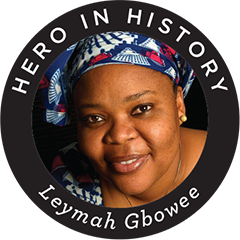
- Gbowee is a Nobel Peace prize winning activist whose interfaith organization, Women of Liberia Mass Action for Peace, is credited with helping to bring end to Liberia’s fourteen-year civil war.
- Gbowee gathered thousands of women from throughout country and across ethnic/religious divisions in organizing protests and strikes in Monrovia—and at the peace talks, held in Accra, Ghana, themselves.
- When talks appeared to be breaking down, Gbowee and 200 other women formed a human barricade, preventing warlord Charles Taylor and his representatives from leaving until peace had been achieved.
- The close of the conflict paved the way for the election of Ellen Johnson Sirleaf, Africa’s first elected female head of state.
“Women are the ones that bear the greatest burden. We are also the ones who nurture societies.”
—Leymah GboweeDan artist
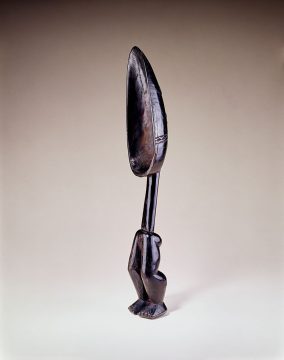
Nimba County, Liberia or Montagnes District, Côte d’Ivoire
Ceremonial spoon (wunkermian)
Early to mid-20th century
Wood, metal
Bequest of Samuel Rubin, 79-16-28
Hero in History: Ellen Johnson Sirleaf
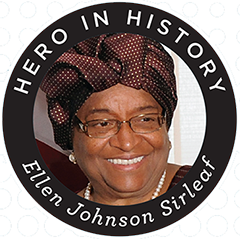
- Born and raised in Monrovia, Sirleaf went on to study economics and public administration at Harvard.
- Sirleaf served as finance minister under multiple pre-civil war Liberian administrations, earning a reputation for integrity in her clashes with the military governments. She was arrested several times, and went into exile.
- In exile, Sirleaf served with multiple global institutions, including the World Bank, Citibank, and the United Nations.
- Sirleaf returned to Liberia in 2003 to chair the Commission on Good Governance, which sought to prepare the county for elections following two devastating civil wars.
- Elected twice to the presidency (2006-2018), she worked to secure foreign investment and to have Liberia’s entire foreign debt forgiven. She instituted a Truth and Reconciliation Committee to address Liberia’s devastating recent decades, on which Leywah Gbowee, with whom she shared a Nobel Peace Prize citation in 2011, served.
"If your dreams do not scare you, they are not big enough."
-Ellen Johnson Sirleaf, delivering commencement remarks at Harvard, May 26, 2011The Anago Master (Yoruba artist)
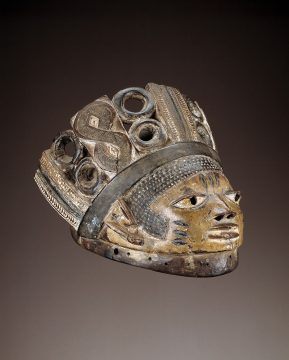
Anago or Ifonyin region, Pleateau Department, Benin
Gẹ̀lẹ̀dẹ mask
19th century
Wood, pigment
Museum purchase, 97-11-1
Hero in History: Funmilayo Ransome-Kuti
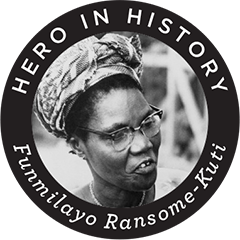
- Funmilayo Ransome Kuti was a Nigerian womens’-rights activist, political campaigner, and teacher—and also the mother of Afrobeat superstar Fela Kuti.
- She was an advocate for female suffrage, founding a womens’-rights organization, that became a national union of women.
- Ransome-Kuti founded the Commoners People’s Party; she was a delegate to independence negotiations with the British.
- She was murdered during a raid ordered by Nigeria’s then military government on Fela’s compound in 1978.
“There has not been a—ny—body, in these whole politics in Africa—only two people have walked on the streets to [have] people follow the way they are going—Nkrumah, and my mother!”
—Fela Kuti, speaking of his murdered mother, Funmilayo Ransome-KutiSokari Douglas Camp
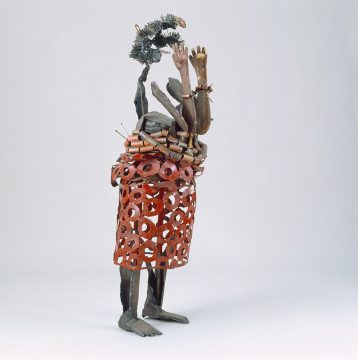
b. 1958, Buguma, Rivers State, Nigeria
Works in London
Small Iriabo (Clapping Girl)
1987
Steel, wood, paint, motor
Museum purchase, 97-5-1
Born in a Kalabari community in which women have historically been prohibited from sculpting in wood and metal, Sokari Douglas Camp has taken up her welder’s torch as an artist in calm defiance of such restrictions. Douglas Camp’s large, semiabstract, often kinetic, figurative works have been inspired by the sounds, movements, and colors of both communities to which she belongs—African expatriates living and working in London, and Kalabari society in the Niger Delta.
This clapping figure recalls the coming-of-age ceremony (iriabo) that initiates Kalabari girls into womanhood. When presented to the community, the initiates are typically dressed in valuable cloth wrappers and adorned with coral beads and necklaces. Small Iriabo (Clapping Girl) claps her hands as though preparing the way for a major event.
Hero in History: Chimamanda Ngozi Adichie
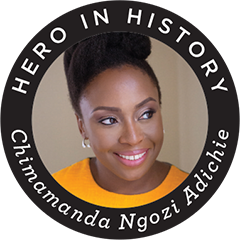
- A recipient of a MacArthur Foundation ‘Genius Grant,’ Adichie is one of Africa’s most critically and popularly lauded current writers.
- Her novels and short stories, including Purple Hibiscus (2003), Half of a Yellow Sun (2006), The Thing Around Your Neck (2009), and Americanah (2013) address Nigeria’s troubled history and the experience of race in America, among other themes.
- Her essay and TED talk, We Should All Be Feminists (2014), has been a widely shared touchpoint for contemporary debate on feminist issues; Adichie has also written on behalf of LGBT rights in Nigeria.
“The problem with gender is that it prescribes how we should be rather than recognizing how we are.”
—Chimamanda Ngozi Adichie, We Should All Be FeministsChokwe artist
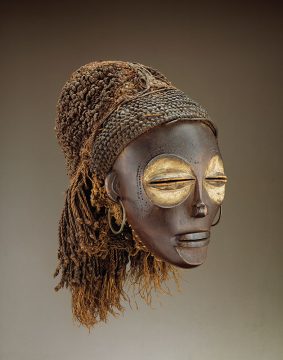
North or South Lunda Province, Angola, or Kwango Province, Democratic Republic of the Congo
Face mask (pwo)
Early 20th century
Wood, plant fiber, pigment, copper alloy
Museum purchase, 85-15-20
Hero in History: Leila Lopes
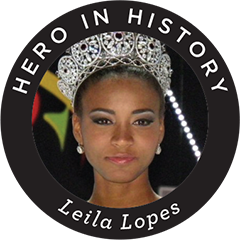
- Prior to entering beauty pageants, Lopes studied business at university in the United Kingdom.
- Upon being crowned Miss Universe in 2011, Lopes become only the fourth African woman (of 60) and the first Angolan to earn the title.
- With her global profile, she aims to raise awareness about HIV/AIDS and the discrimination those with the disease experience globally.
“Being Miss Universe is much more than having a sash and crown. It is about taking pride in my commitment to serving as an ambassador to my country, and to women everywhere.”
—Leila LopesSue Williamson

b. 1941, Lichfield, England
Works in Cape Town, South Africa
Winnie Mandela and the Assassination of Dr. Asvat
1999
Lithograph on paper with plastic film
Museum purchase, 2002-17-1
Hero in History: Winnie Madikizela-Mandela
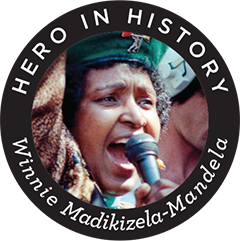
- Trained as a social worker, Winnie Madikizela met Nelson Mandela in 1956, and became his second wife two years later.
- During the 27 years of Nelson Mandela’s imprisonment, Winnie Mandela was continually harassed by the government, facing banning orders, travel restrictions, internal exile, and 17 months in jail herself.
- Throughout her husband’s long imprisonment, she remained a resilient symbol of resistance, keeping his memory and message alive, in South Africa and beyond.
- The kidnapping and beating of four young activists, and the murder of one, Stompie Seipei, in 1988 forever damaged her reputation. She was convicted of kidnapping in 1991, though the sentence was later reduced. Nelson Mandela separated from her in 1992; they would divorce in 1996.
- Later in life, Winnie Madikizela-Mandela swung between moments of achievement and disrepute: She was a deputy minister in the first democratic government, but resigned under corruption charges. She was elected as a Member of Parliament, but was convicted of theft and fraud. She was reportedly at Mandela’s side as he lay dying in 2013, with his third wife, Graça Machel, but later sued his estate for control of his home (and lost).
“To those who oppose us, we say, ‘Strike the woman, and you strike the rock’.”
—Winnie Mandela, 1966"Together, hand in hand, with our matches and our necklaces, we shall liberate this country."
—Winnie Mandela, 1986, alluding to the notorious practice of lighting a gasoline-soaked tire, placed around the head of an opponent, ablaze.Nontsikelelo “Lolo” Veleko
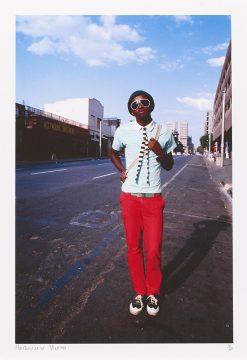
b. 1977, Bodibe, North West Province, South Africa
Works in Nîmes, France
Kepi Bree Street
2006
Digital print with pigment dyes on cotton paper
Purchased with funds provided by the Annie Laurie Aitken Endowment, 2011-7-1.4
Hero in History: Brenda Fassie
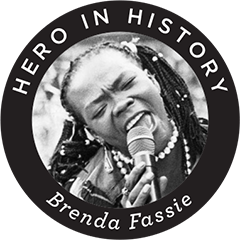
- A precocious and talented singer from a young age, Fassie made it big with a hit single, “Weekend Special,” at the age of 19, propelling her next album to multi-platinum status. In the 1990s, she became associated with kwaito, a genre of house music that sampled African sounds.
- She was celebrated as a voice of South Africa’s disenfranchised—during apartheid, and after.
- Fassie was often compared to the American pop singer Madonna—for the fearlessness with which she promoted her image, but also for the controversy that followed with her. Fassie struggled with drug addiction, and endured turbulent relationships with men and women in the public spotlight.
- Fassie publicly came out as a lesbian in 2003.
- In addition to her music, Fassie is remembered as a pioneering fashion icon, who died tragically young. Brenda Fassie delighted in breaking style taboos and innovating new trends.
“I’m a shocker. I like to create controversy. It’s my trademark.”
—Brenda Fassie, 1998“I’m going to become the Pope next year. Nothing is impossible.”
—Brenda Fassie, 1999Dada Khanyisa
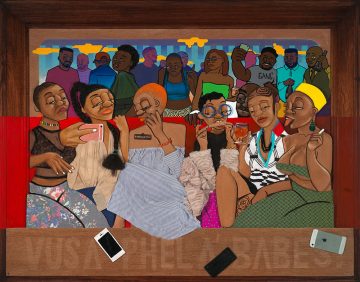
b. 1991, Umzimkhulu, KwaZulu-Natal Province, South Africa
Works in Cape Town, South Africa
AMA #WCW
2017
Acrylic and mixed media on wood
Gift of Shari and John Behnke, 2018-11-1
Heroes in History: Beverly Palesa Ditsie and Simon Tseko Nkoli
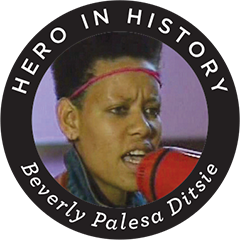
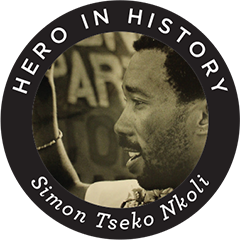
- Ditsie and Nkoli are activists who had an important early role in creating legal and cultural space for LGBT people in South Africa in the early 1990s. Together, they were part of a cohort of activists who founded GLOW (Gay and Lesbian Organization of the Witwatersrand), the first national black LGBT organization in South Africa.
- A committed activist, Beverley Palesa Ditsie was the first out lesbian woman to address the United Nations on LGBT rights, speaking the Beijing Women’s Conference in 1995.
- Arrested as an anti-apartheid activist, Simon Nkoli came out while in prison. He used the moment to try to change the attitude of the African National Congress (ANC) toward gay rights.
- After 1994, Nkoli met with President Mandela and campaigned for the inclusion of protections for LGBT people in the new constitution. In 1996, South Africa became the first country to constitutionally prohibit discrimination based on sexual orientation.
- Together, Ditsie and Nkoli organized the first Pride March in Africa, in Johannesburg in 1990.
